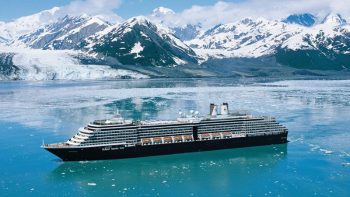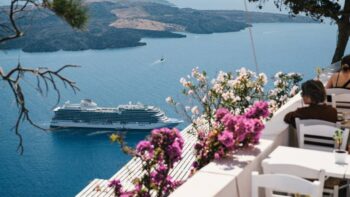If you’re like me, Portugal has always been on my bucket list, but little was known to me beyond the major tourist sights of Lisbon, Porto and the Algarve.
Being invited to take part in last week's Air Canada-United Airlines Race was an opportunity to venture off the beaten path and experience the heart of the country, in the region of Alentejo, Portugal.
The region is known for its slower pace, quiet, and the genuine kindness from locals who are always happy to see you and curious about where you’re from.
“I think our assets have always been here, what makes us different is the way we welcome everyone to feel at home”, Ines Almeida Garrett, Director at Portuguese Tourism. “When everything else fails you will always have Portuguese hospitality”.

The Air Canada-United Airlines race itself took place in the narrow cobblestone streets of UNESCO World Heritage site Evora, with its rich history, Roman ruins, Gothic cathedrals and Moorish-style palaces.
During the race, agents made a photo stop in particular that was quite out of the ordinary. The Chapel of Bones was built in the 16th century by Franciscan monks who used the bones of 5,000 corpses to build the walls and columns of the church. An eerie sight indeed.
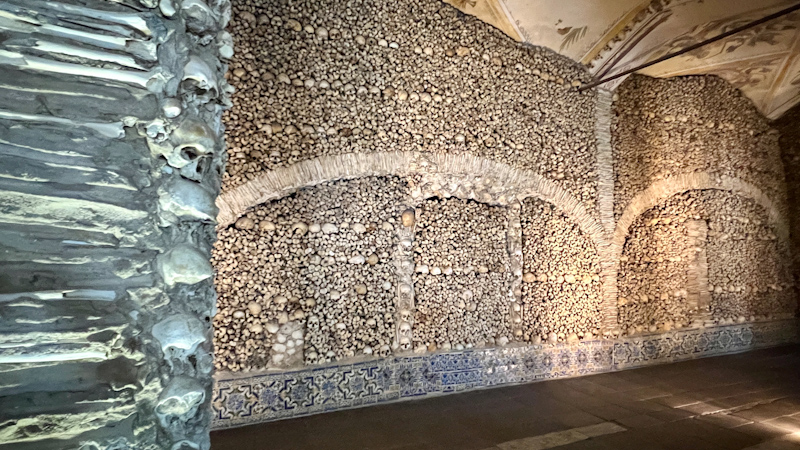
After the dust settled from the race, our hosts at AC and UA offered each participant the option to take a three day FAM led by a local guide. I chose the Gastronomy and Wine tour because I consider myself a foodie and who doesn’t enjoy a glass of wine - or 5 - after a busy race in 30 degree weather?
If you want to get a better perspective on what is locally and sustainably grown and the people and stories behind the farms and vineyards, this is the most intimate way to experience that first hand.
Like the AC race teams, our small tour group was a mix of Canadian and American travel advisors plus AC and UA team members.
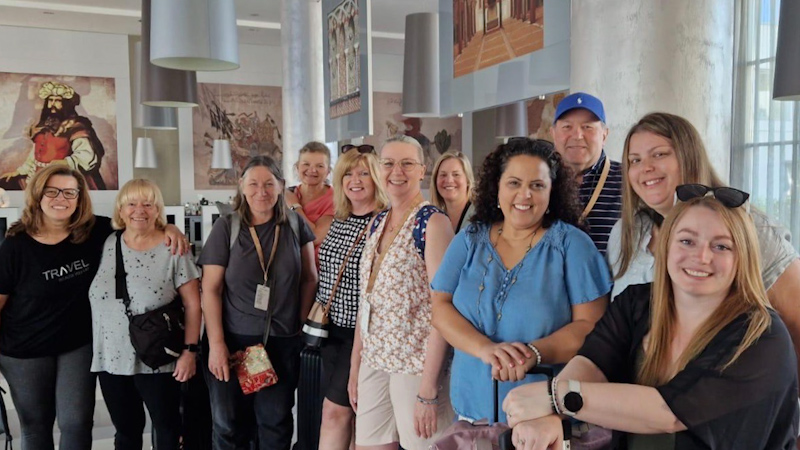
Red or White?
We got to visit a few different wineries, where old and modern come together. There were two really memorable examples of that old-meets-new wine making on our tour.
One was Fitapreta Vinhos. It is a stunning property with a 14th Century palace where white wine has been produced for centuries in french oak barrels or traditional Tahla clay pots. They also have a modern winery with a steel and cork exterior where red wine is produced.
We sampled several wines from their collection and sat down to a farm-to-table lunch of traditional meats and cheeses, salads and cod croquettes.
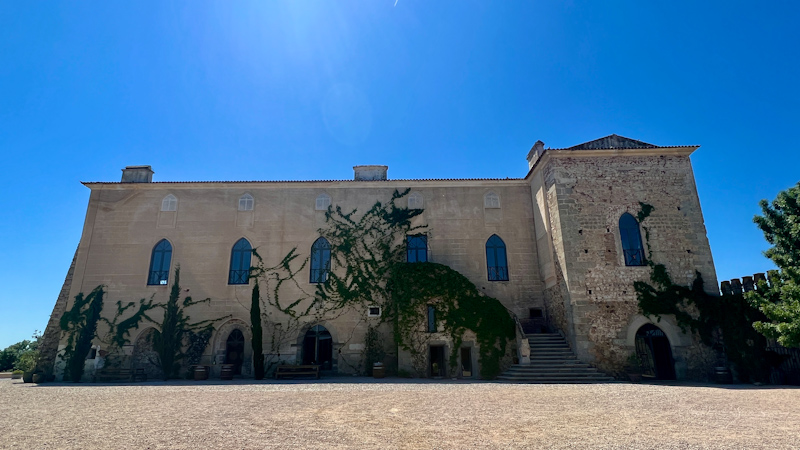
Honrado winery, 60km south of Evora, is set in the small village of Vila de Frades.
An unassuming front entrance from the road takes you downstairs into a cave-like dimly lit cellar with Roman arches and walls lined with Tahla clay pots.
We learned the artisanal process for producing wine in enormous clay pots, and sampled standard and premium wines with cheese before heading next door to their traditional Portuguese restaurant for a 3-course lunch.
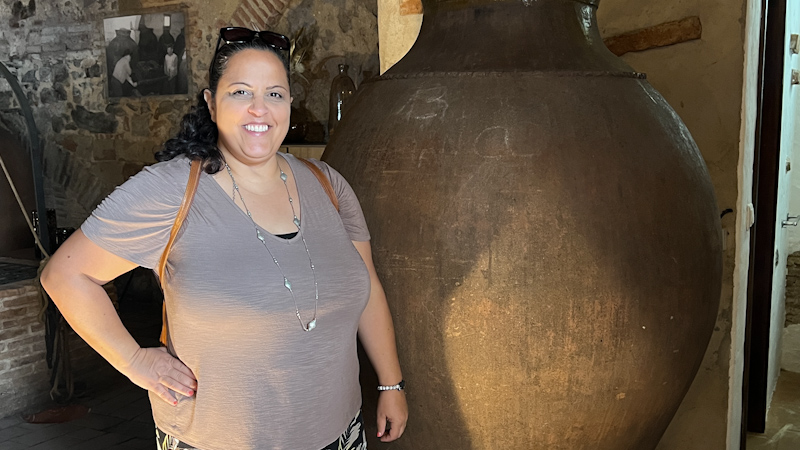

Put a Cork in It
Pepe Aromas is a combination of cork tree forest and prickly pear cactus farm about 35 minutes from Evora.

The cork tree has been designated Portugal's National Tree since 2011, therefore it is illegal to cut down or destroy these trees.
The first harvest of the cork is 25 years after planting and then nine years later for the second harvest and nine more years after that. It’s no wonder these trees are special and farms like Pepe Aromas are passed down through generations.
Because cork is lightweight and heat resistant, it is used for more than sealing wine bottles, including construction, fashion, aeronautics and aerospace applications.
A "Thorny" Issue
Beware of thorns when you walk through a cactus grove!
These shrubs are carefully harvested during late summer, when the fruits are ripe and ready for picking. “Any defective fruit is used to make jelly, juice, soaps, and vinegar”. Micaela Amorim, Sales Manager tells the group,.
“And the small seeds make one of the most valuable cosmetic oils for treating skin problems, sun spots, wrinkles and is a natural moisturizer”.
Needless to say, our group sold out the oil in their gift shop.
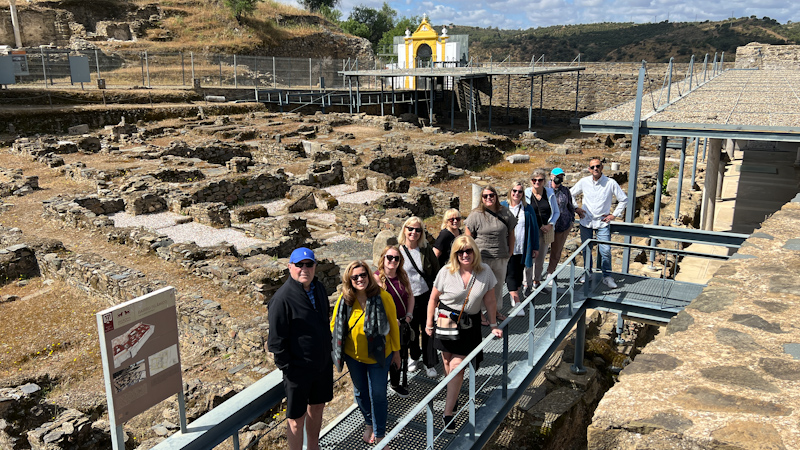
FAM-tastic Advisor Feedback
“The race was great because you don't know anybody and all of a sudden you are a team of six people and you bond very quickly,” Lucie Clavet - Voyage Aquaterra, Laval QC told Open Jaw, adding, “I loved the challenge and the destination of course, Evora was such a beautiful city.”
“My clients are looking to explore new destinations and ask me about Portugal all the time," Aphrodite Karagioules, Mediterranean Specialist at Omega Travel, Vancouver told Open Jaw. “After doing this FAM, I’m more confident selling Portugal like I do selling my Greece and Italy product."
“Tourism is very important to Portugal’s economy” Almeida-Garret explains, “and we have seen a rise in digital nomads who stay for 1-2 months in Portugal, to work and relax in our beautiful country.”
In 2019, Portugal had over 17 Million visitors, and since the return of international travel post-COVID, this popular destination is looking to exceed those numbers in the years ahead.
As for the AC-UA Race, “Next year we will be leading the race and we'll take everything that we’ve learned this year and together with our Air Canada partners we will try to decide where in the world we’ll have the race,“ Laurie Severance-Johnson, United for Business Marketing said.
“Air Canada was so gracious to help teach us all that they had learned in the years before and we know that we could participate and make the race even bigger and better.”




